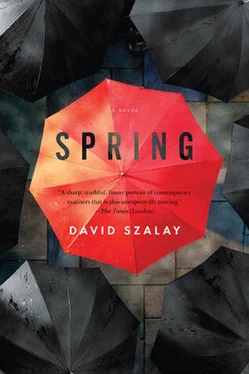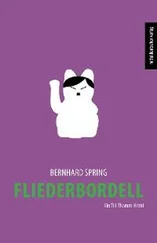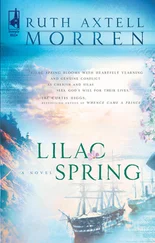The late daylight had the quality of wet slate. She sat down on one of the tartan tub chairs. Fraser was still lying there. He seemed to be in a less tight position, and in fact he must have moved—he had taken his jacket off. Nor was he asleep. His eyes were open. The tired light picked them out like marbles, staring at nothing.
There was one small mercy. On Sunday morning the clocks went forward, shortening the weekend by an hour.
He woke up with a strange feeling. Sunlight like a shivered mirror in the area, and his watch an hour slow.
In the afternoon he took Omar to the zoo. James has no memory of ever having been to London Zoo. Omar, however, seemed to know the place well. The first things they saw were some lizards. The lizards were in a darkened hall, walled up in waterless fishtanks full of rubber foliage. Omar stood on tiptoe to peer into the tanks or James lifted him. Mostly the lizards just lay there, looking sad. Probably they weren’t actually sad, probably it was just something about the shape of their scaly mouths. Probably that’s how they would look in the wild. Though in the wild, James thought, the ever-present fear, the need to fend for themselves, might make them less lethargic, might pep them up a bit. Nothing was about to happen to them in those fishtanks; they had probably worked that out by now. They were just waiting for their next meal—and they only ate once or twice a week. It was muggy in the lizard house. For a while Omar was enthusiastic, pointing and whispering as if they might overhear him. Then he lost interest—they had not even looked at the most impressive specimens, in a sort of shop-window of jungle—and wanted to leave.
They wandered around in the sunshine. The animals were strangely elusive. You had to seek them out down winding paths. They saw some medium-sized monkeys, making a stink like the inmates of a prison staging a no-wash protest. They were screeching, making a lot of noise—in spite of which they were just not that interesting. Omar seemed to find them shrugworthy. The silverbacks had more mystique. Sitting very still, they looked at the world through startlingly human eyes, scratched their necks with startlingly human fingernails. More or less extinct in the wild—a few score in their shrinking jungle, waiting for the end—they and their kind were now, James thought, in effect a species of high-maintenance pets. Wards of the state. There was something surreal about the sight of them, just sitting there surrounded by toys (a tyre, for instance) while twenty twittering children pressed their faces to the perspex.
They left the primates and found a neglected-looking structure that ponged very strongly of manure. It was not unlike the stink of Miller’s stables. Ostentatiously holding his nose, Omar wanted to leave. He wasn’t joking—the overripe stench of sweet manure was too much for him. There were tears in his eyes as James ushered him out.
It was quite a warm day—the warmest of the year so far—and Omar took off his parka. He was dressed exactly as Steve would be—Converse trainers, soft jeans, lambswool jumper, parka with polyester-furred hood. Essentially, James thought, taking the parka, the inmates of the zoo lived like the poorer human members of prosperous Western societies. Like them, they had to put up with miserable housing, monotonous food, persistent minor indignities. On the other hand, they wouldn’t die of starvation, or exposure, or waterborne diseases. If they were ill, medical professionals would take a look at them. No, it wasn’t perfect, but if you were eking out a terrifyingly insecure existence on a savannah somewhere, or in some jungle, you might take a second look at the zoo if offered a swap. The point was, he thought—perhaps trying to persuade himself—it was too simple just to pity the zoo animals. In many ways they were the lucky ones.
Omar was now talking about some fish he had once seen—they were odourless, perhaps that was their appeal—but James did not know where to find them. They passed the insect house, which neither of them wanted to investigate. They had an ice cream. They saw a serval cat with ears like radio telescopes, staring with psychotic intensity at a pigeon which had flown into its walled enclosure—there were portholes in the wall, through which the scene was visible.
Then Omar saw the merry-go-round.
As soon as he did, he lost all interest in the animals. James tried to explain that the world was full of merry-go-rounds; there would be time enough for them—the animals were what they were there…
Omar was now in tears. His puce face was like the sad mask of the theatre logo. The ends of his mouth were down by his chin. James had intended to tough it out, to at least make him look at one or two more animals before letting him loose on the merry-go-round. He felt that Omar should be more interested in animals than in merry-go-rounds, more interested in living things, our fellow tenants of time and space, than in tawdry machines. ‘Let’s just…’ he said, squatting to Omar’s level. ‘Let’s just have a look at one more…’
It just wasn’t worth it.
Tears pursuing each other down his empurpled face, Omar was making a lot of noise. People were starting to stare.
‘Okay,’ James said, ‘you can go on the merry-go-round.’
Instantly Omar’s face was like the smiling mask of the theatre logo. He was living in the moment, there was no doubt about that. Holding the fibreglass neck of an undulating unicorn, he smiled at James as he went round. It was a smile which expressed an experiential purity quite elusive in later life—probably that was why it was so lovely to see, why it possessed such an immense vicarious pull. Helplessly smiling himself, James waved. He was worried about what Omar would do when the music stopped and he had to dismount. In the event, he was fine. To, ‘Was that fun?’ he answered with a mature nod. He said he wanted to eat. And when they had eaten, he seemed to tire and said he wanted to leave.
‘But we’ve hardly seen any animals,’ James said, smiling. It was true. They had hardly scratched the surface of the place, zoologically, and James felt they ought to stay longer. Omar had no such feelings of obligation. James managed to tempt him into finding the lions, or rather the lion—only one was visible, in her high-security enclosure—and then into a more immediate and much smellier encounter with the giraffes. The giraffes. Seeing them just standing there, being giraffes in the middle of London, James had an unprecedented sense of the strangeness of the world. As he and Omar left the giraffe house they were swept up in a stream of noisy, foul-mouthed French schoolchildren whose intention it obviously was to terrify the animals in any way they could. They were upsetting Omar too. And indeed he was now more and more intensely keen to leave. Even the energetically pointed-out okapi—a strangely neglected creature, it looked like a misunderstanding in a medieval manuscript—only held off the next wave of tears for ten seconds or so, and these tears were more despairing than the merry-go-round tantrum, with its all-too-obvious object, and emerged with long low-pitched wails and howls that it seemed nothing would staunch.
Except sleep.
He fell asleep on James’s shoulders as they made their way out of one teeming zoo and headed towards the other, with its market and its lock, at the far end of Parkway.
Later, sitting in Isabel’s orderly kitchen with a mug (Che Guevara) of Earl Grey while Omar told her what animals they had seen—and he seemed more enthusiastic then, talking about them, than he had when they were there, seeing them—James, for the first time, found himself envying his sister’s life. The tidy, well-lit maisonette (lights on everywhere), Omar’s kindergarten daubs magneted to the fridge, the Volvo in the parking space outside (the Volvo that went to the two-acre Sainsbury’s in Finchley every Saturday), the quietly up-to-the-minute electronics everywhere, the sections of the Observer strewn on the sofa, where Steve had been lying after lunch, the Banksy prints in the hall—it was all just so safe and warm and middle class, and sitting there in the kitchen, he felt an envious tug towards something like that. Yes, even towards its intrinsic predictability. Even its faint smugness.
Читать дальше












